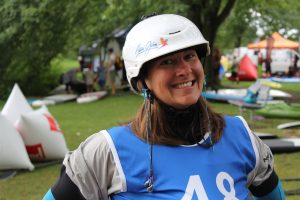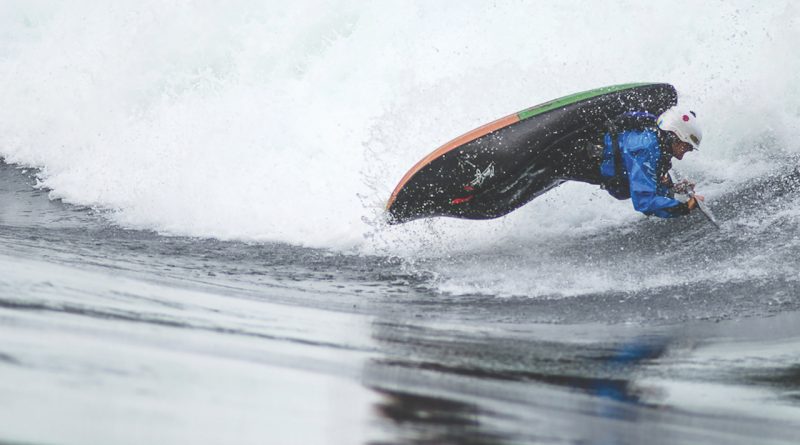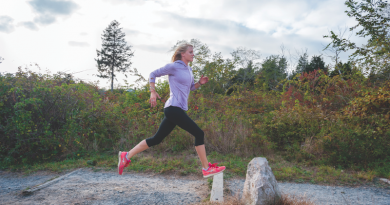The Spawning Grounds
Vermont’s swollen spring rivers have given birth to some the world’s best whitewater kayakers. Here’s how you can get after it, too.
As soon as the snow starts to melt, Elaine Campbell heads for the Deerfield River. Her home in Readsboro, Vt., is a five-minute drive from the class IV and V rapids that she now knows like the back of her hand. “I know it can smack me down at any moment, but I just feel so comfortable when I’m running it,” she says of the Deerfield.
Campbell has loved whitewater ever since her family took trips from her home in Massachusetts to raft the Sacandaga River near Lake George, New York. For her 22nd birthday, her brother bought her a ticket to an outdoor workshop and asked her to choose between rock climbing and whitewater kayaking.
“I was like, I wanna learn how to kayak!” she says. “That was it. I just kind of fell in love with it. I met my husband the first weekend on the river, and it turned into this crazy thing.”
Flash forward 16 years: Campbell now competes in freestyle kayaking, river running, stand-up paddleboarding, squirt boating, boater cross, slalom and rafting. She’s earned spots on the U.S. Freestyle Kayak Team four times, and in 2013, was on the U.S. Wild Water Sprint Team and the freestyle team in the same year. Later this spring, she will load her dog, cat and husband into an RV and tour the continent to compete in national tournaments and find new playholes—often in places like California and British Columbia. But the Deerfield remains one of her favorite spots.
Her preferred discipline is freestyle, a kind of next-level whitewater kayaking that involves flips and twists that can make any new spectator white-knuckled. Right now, she’s trying to master a stunt called the tricky-woo.
“It’s a split-wheel, so you make the bow of your kayak vertical and then you do a 180-degree twist on your stern, and then you spin the boat on your stern another 180-degrees in the other direction, and then you slam the bow back down,” she says. “It’s a very technical trick. I always get glimpses of being able to do it, and then I don’t. Not many females can do it.”
In the winter, Campbell works at Timber Creek Cross Country Center in West Dover, Vt., instructing and managing retail. But she gets out on the water whenever she can. By mid-February this year, she had already been paddling twice.
“When I’m home, I train freestyle on the West River,” she says. “In Dummerston, there’s a spot that we call Dummerchuck. It’s a really awesome playhole. I’ve learned a lot at that spot. It’s about 40 minutes from my house, and I go there whenever it’s running.”
Campbell isn’t the only accomplished paddler from Vermont. Many world-class kayakers got their start on Vermont’s narrow and technical rivers.
Ryan McCall, organizer of the New Haven Ledges Race—which turns 10 years old this year—sees many of the best on the Ledges every season. “A lot of guys got their bananas together here,” he says. Among them, he mentions locals Calef Letorney, a freestyle kayaker who won the 2001 Junior Freestyle World Championships and now works as a paragliding instructor in Westford, Vt. There’s Justin Beckwith, a former Nordic coach for the Green Mountain Valley School in Waitsfield, who repeatedly wins the New Haven Ledges Race. And Montpelier’s Hugh Pritchard, also a regular champion at the Ledges Race, was on Great Britain’s junior canoe slalom team—and went to the Olympics for biathlon in 2002.
Then there are the greats. The Kern Brothers, Willie, Johnnie and Chuck—some of the world’s best whitewater kayakers—grew up in Stowe. “They honed their skills here,” McCall says. “There are very few rivers in Vermont that weren’t paddled by the Kern brothers.”
Willie and Johnnie, twins, are still at it and living out West, though Chuck Kern died while paddling with his brothers on the Gunnison River in Colorado in 1997. In 2004, Willie and Johnnie were part of an expedition that paddled the legendary first run down the Tsangpo in Tibet—known to be one of the most difficult rivers in the world—winning them international acclaim.
So what is it about Vermont rivers that has made so many paddlers so good? Like the tree skiing in Vermont, the rivers are technical.

“There’s nothing super dangerous or hard about tree-skiing in Vermont,” McCall says, “but the trees are stupid tight. It’s the same with boating. Our rivers are low-volume, and they’re relatively safe, kind of like the skiing around here. You’re not on a giant, several-thousand cfs (cubic feet per second) river. It’s different. It will challenge you, it will definitely catch you off-guard, but it’s like the skiing here—it’s really good.”
Once you’ve graduated from the beginner rivers (of which there are many), there’s still plenty to do. The Big Branch River in Mt. Tabor, near Rutland, the Middlebury Gorge, the Gihon River, the New Haven, the Wells River, West River and the Mississquoi all boast class IV and V rapids in the spring as the water runs high. For intermediate whitewater, you’ve got the Mad River, the upper branch of the Lamoille, the Green River, and the White River.
Really, if you’re paying attention and there’s some rain or snowmelt in the forecast, you can find good whitewater in Vermont just about anywhere.
“When people ask, ‘Where you been skiing?’ nine times out of ten, I’ll say, ‘Wherever I’m pointing my skis,’” McCall says. “People say, ‘Where do you go boating?’ And I say ‘Wherever there’s water in the river.’”
Where’s the Whitewater?
If you want to watch some of the northeast’s best paddlers in action—or jump in yourself—here’s where to do it:
Events
New Haven Ledges Race | Bristol, April 13
Celebrate the 11th anniversary of the Ledges race, which began as an official way to earn bragging rights among friends. The classic run gives you 1.3 miles of boulder gardens, slides, waterfalls and class IV whitewater running alongside Lincoln Road. Kayakers navigate a 15-foot drop called “The Toaster,” then slap a nearby buoy to stop the clock. facebook.com/NewHavenRace
Riverfest | Wells River, Newbury, April 18-21
Dartmouth College’s Ledyard Canoe Club hosts a weekend of events, including the Mascoma Slalom (the oldest consecutively run slalom event in the country) and the Wells River Rumble (a mass-start, one-mile, down-river race that includes a class IV rapid). ledyardcanoeclub.or
RASTA’s DisasTour VIII | Rochester, April 27
Celebrate community and resilience with this 19K pedal, 8K paddle and 11K run through Rochester, Hancock and Granville. Do all three legs or compete as part of a relay team.
Blackwater Slalom | Dover, New Hampshire, April 28
Race through suspended gates through class II and higher rapids on the Blackwater River in N.H. Part of the New England Slalom Series. Don’t miss the townwide Roast Pork Dinner on Saturday night. nessrace.com
Otter Brook Canoe and Kayak Race | Roxbury, New Hampshire, May 5
A 5-mile class III race from the base of the dam on Otter Brook to the Route 12 bridge, just south of Keene, N.H. Otter Brook is a narrow, twisty stream with lots of rocks to maneuver around. neckra.org
Fiddlehead Slalom | Winooski River, Montpelier, May 12
Slalom through suspended gates on the Winooski River’s class II and higher rapids in this event, which is part of the New England Slalom Series. Get a feel for the course by helping to hang gates from wires above the river the day before the race. nessrace.com
Vermont Paddlers’ Club Whitewater Novice Clinic | Waterbury, June 1-2
This two-day clinic will introduce beginning paddlers to the basics of boat handling, river reading and driving a boat through moving water. vtpaddlers.net
Onion River Race and Ramble | Winooski, Bolton, June 2
Canoe or kayak through the Greens in Vermont’s largest river race, starting at Bolton and heading down the Winooski River. winooskiriver.org
Winni River Days & Winni Slalom | Franklin, New Hampshire, June 22-24
Catch live music, whitewater clinics, beer, free morning yoga, food plus camping right in town and two days of whitewater races. Don’t miss the Winni Slalom on Saturday, a race through suspended slalom gates and class II rapids on the Winnipesaukee River. nessrace.com or millcitypark.com
BrattlePaddle Canoe & Kayak Races | Brattleboro, June 30
This race, which begins in Brattleboro, Vt., takes place in the West and Connecticut Rivers. Race 9 miles or take a 3.5-mile leisurely paddle on a canoe, kayak or SUP on a recreational route. neckra.org
Releases
West River | Jamaica State Park, Jamaica, Vt.
The U.S. Army Corps of Engineers schedules regular controlled water releases from the Ball Mountain Dam. This year, there will be two releases: on May 3 and September 20-21, paddlers can enjoy class II-IV rapids on the West River. vtstateparks.com/jamaica
Deerfield River | #5 Station Dam, Monroe, Mass.
About a mile south of the Vermont-Mass border, the Deerfield flows between 900 cfs and 2,000 cfs. Releases are scheduled for May 26-27, June 10, 16-17, 24 and 29-30. zoaroutdoor.com
Fife Brook | North Adams, Mass.
The Deerfield’s Fife Book section ranges from 700 cfs to 2000 cfs, at which point it becomes class III-IV. Scheduled releases are: April 6, 10-12, 14, 17-21 & 24-28; May 11-12, 18-19, 22-26, 29-31; June 8-9, 15-16, 19-23, 26-30 (9 a.m. start on June 29, 4 hour release); July 4-7, 11-14, 17-21, 24-28, 31; August 1-4, 8-11, 15-18, 22-25, 29-31; September 1-2, 4-8, 11-15, 25-29; October 2-6, 9-13. Releases take place from 9:30 a.m.-12 p.m. zoaroutdoor.com
Featured Photo Caption: Vermont’s Elaine Campbell sends it on the Skookumchuck Wave in British Columbia. “The wave is just epic,” she says. “I look forward to it every year.” Photo courtesy Elaine Campbell.
Last updated April 9, 2019.



Pingback: Vermont Sports Magazine, March/April 2018 - Vermont Sports Magazine